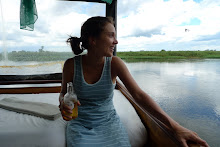Emang Basadi (Stand up, Women!)
Today is Saturday, and this morning I attended a meeting of a group of female farmers from Kachikau who are trying to apply for funding to start up a commercial vegetable garden on the outskirts of the village. Through Prince, they had invited me to the meeting with the hopes that I might be able to assist them with their project proposal. The government of Botswana provides a lot of opportunities for various enterprising groups to obtain seed money, but in almost all cases requires extensive proposals to be submitted that many local groups find quite daunting.
We arrived at their fields at about half past eight on what was thankfully still an unusually cool morning, and found about fifteen women seated under a nearby tree. The meeting started with the usual quick prayer, but without much of the other time-consuming pomp and circumstance you frequently find in meetings here. Already I liked this group! I liked them even more as we began to review their proposed project. They are a group of about 30 women who have pooled together enough land to qualify for electrified fencing from the Department of Agriculture, which will protect their crops from the increasingly destructive elephant and wildlife predator population. They intend to set up a vegetable garden, with the twin goals of creating a source of local employment/income generation as well as a way to provide their community with healthy, reasonably priced vegetables. As I have written about before, the lack of local markets here in the village is quite a problem—families currently trek in all the way to Kasane to buy their groceries from overpriced chain grocery stores, costing them both time (its about a two hour trip to Kasane) and money (the combi ride is not cheap and neither are the groceries available once you arrive in town). I’ve wondered over and over why there aren’t more local farmers setting up markets or farm stands in the villages, and now here is a group trying to do just that!
I have a lot more faith in the potential of their project than say, the chief’s brainchild project of starting up community fishponds in the village (something I think he has maybe been talking about for years, with little action or progress to show for it), and I am excited about what appears to be a truly grassroots project—this isn’t something that USAID has come in and told these women to do; it is an enterprise that these women have begun to set up on their own. They have a secretary who speaks English fluently, and the group had already drawn up a pretty comprehensive proposal, complete with diagrams of organizational structure (from manager director down to storeroom keeper) and a cost/profit table. In the discussions, there seemed to be a healthy amount of disagreement and then working towards a consensus, and they weren’t afraid to speak their minds in front of me. In fact, I was humbled to have them point out that in explaining how I thought they should improve certain parts of the proposal, I was speaking more directly to Prince (who had de facto taken over mediation of presenting in English their proposal to me) than to the ladies—turn and face US when you speak, one lady said in Setswana!
Still, the project will not be easy to get off the ground—even if they obtain the required funding for the initial start-up of the project, how exactly will the funds be managed? This is an issue in any community-based enterprise—will all 30 women have a say in how funds are managed, or will they elect a smaller board of trustees to be in charge, or will it be the “managing director” who controls the purse strings? How will they decide how benefits will be distributed? Once they start making a profit, will they re-sew that profit back into the enterprise or parcel it out amongst the ladies to do with what they like? Maybe these are all bridges they can cross later once they at least have the garden up and running, but I foresee that these will not be easy questions to answer, once the money (hopefully) starts coming in.
In either case, I was glad I had been invited to the meeting and would like to think that I was able to help even in a small way to develop their proposal so that it meets the rather extensive requirements of the funding agency, the Women’s Affairs Department. It was nice to be involved in some aspect of the community outside of my own doctoral research, and was exactly the sort of activity I have been wanting to take part in—something a bit more immediate and tangible in terms of my contribution to the village than saying “hopefully my research will provide information that will inform government and policy-makers about blah blah blah…”. And out of my own self-interest, I would LOVE to see some fresh veggies like merogo (greens) available in Kachikau rather than schlepping to Kasane to face the choice of wilted broccoli or yellowed tomatoes. Whether it’s from a Marin County farm box or a Batswana village garden, hooray for tasty local produce!!


0 Comments:
Post a Comment
<< Home